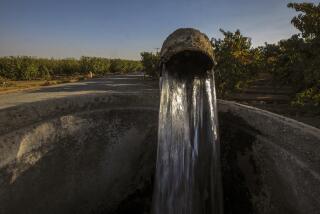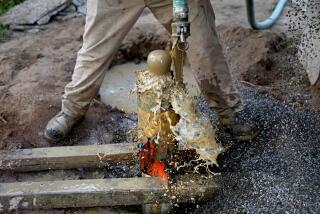Playing politics with California’s drought
- Share via
As California’s drought continues, and more than a dozen rural communities ponder what to do when their drinking water runs out sometime in March, it would be nice if the state’s Republican politicians brought some straightforward plans for relief to the table. But what many of them are bringing instead is a tired political tactic barely, and laughably, disguised as a remedy for the lack of rainfall.
The “man-made California drought” is the term House Republicans use to describe the state’s current dry condition, as if it were somehow the hand of humankind, environmentalists or, even worse, Democrats that has stopped the snowfall over the Sierra and kept the dams that store water for fields, orchards and homes from being replenished. Funny, isn’t it, that folks who question man’s ability to affect the global climate are so quick to assign human causes to the drought?
Most recently, the term “man-made drought” has been used by Reps. Kevin McCarthy (R-Bakersfield), Devin Nunes (R-Tulare) and David Valadao (R-Hanford) in conjunction with House Bill 3946, a retread of earlier bills that sought to upend years of negotiations and reams of carefully crafted law and policy to protect water rights and balance the needs of the state’s many interests and communities.
Of course, they aren’t talking about the real drought. If they were, they’d acknowledge that it is actually created by a stubborn high-pressure zone off the Pacific Coast that meteorologists have taken to calling the Ridiculously Resilient Ridge. That mountain of dense air has blocked the winter storms that typically move down from the Gulf of Alaska and east into California, and that blockage has kept rain from falling in the southern part of the state and, more important, snow from falling on the Sierra. We can only guess how many more months, or years, might pass before it dissipates.
What they really mean when they refer to the “drought” are the cuts in water allocations to agricultural interests in the Central Valley, not just in dry years but potentially even in wet ones, as the state works out a plan to distribute water wisely among interests who need, or at least want, more than will ever be available. The proposed House bill would not provide any relief from the real drought but would instead permanently reallocate water for one interest.
In their imagined “people versus fish” scenario, towns are going dry and growers are going out of business because crazy environmentalists are hogging water to protect an obscure fish, the delta smelt. Water that could irrigate fields and keep people working is instead being kept in the Sacramento-San Joaquin River Delta and flushed into the ocean.
What they don’t like to point out is that without that supposed flush pushing out into the Pacific, seawater would continue to intrude farther into the delta, leaving only useless salty brine to pump into canals and onto fields — and then where would the growers and the rest of us be? Without restoring the dry stretch of the San Joaquin River, there can be no recharging of Central Valley towns’ groundwater supplies and no hope that the river will rescue orchards and cities with southern Sierra snowmelt in the event global climate change forever reduces levels of snowfall in the mountains to the north. And as for the smelt, the Endangered Species Act protects not only that fish but all of us, by holding together the fragile environmental web we rely on.
Agriculture is an essential California industry, with benefits that are felt far beyond the region where crops grow. California’s economy depends on it. But three out of every four raindrops, three out of every four snowflakes, that fall on California and are diverted for human use go to agriculture. It is part of a network of water users that must conserve more and do a better job of planning for the future.
California has a plan — the Bay-Delta Conservation Plan — that has brought together representatives of the competing interests who recognize that they must work together to sustain one another with limited supplies of water. The Republican bill would undermine that effort by demonstrating that any agreement can be broken at any time by legislation. The state’s water users — all of us — need laws that support, not subvert, efforts to balance our water use.
More to Read
A cure for the common opinion
Get thought-provoking perspectives with our weekly newsletter.
You may occasionally receive promotional content from the Los Angeles Times.






